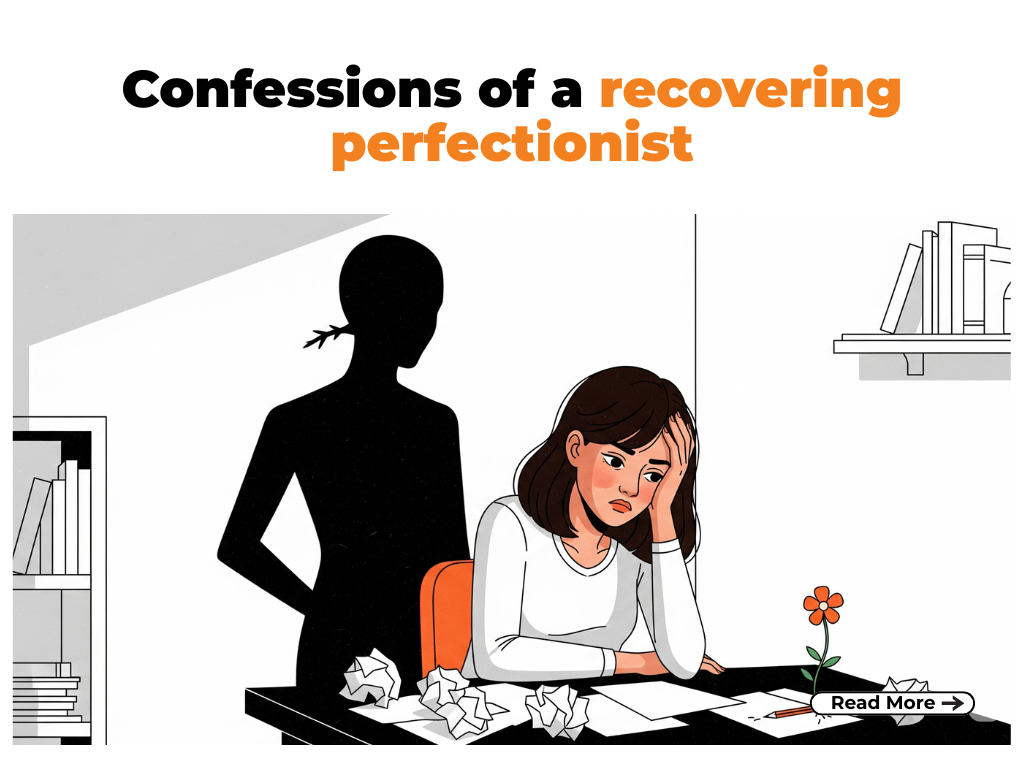It took me thirty minutes just to decide how to begin this piece and a little more than two weeks to finish it. In my journey as a writer and a human, understanding the signs of being a recovering perfectionist was just as important as learning how to function again after experiencing setbacks like burnout or even symptoms overlapping with posttraumatic stress disorder.
Not because I lacked words, but because every possible opening sounded either preachy, clichéd, didactic, haughty, or (worst of all) painfully dull. I had not even begun and I was already imagining unseen readers rolling their eyes. Too scared of judgement, with the deadline hovering like a black cloud, a thought kept luring me: If it isn’t perfect, why write at all?
We tell ourselves we’re “not ready yet” when we’re actually terrified.
Perfectionism, at its core, is a healthy personality trait, driving people to perform their best. However, indulge in it just a few degrees more, and it becomes a personal liability. Perfectionism wears many disguises—ambition, high standards, attention to detail—but beneath the mask hides a simple truth: a deep rooted sense of embarrassing oneself.
To me, it felt safer to polish imaginary sentences in my head than to set imperfect words loose in the world. Some authors publish a novel every other year; the perfectionism‑stricken writer may spend a decade tinkering with one draft no one ever reads.
When someone proudly declares, “My greatest weakness is that I am a perfectionist”, it almost sounds noble: a refusal to stop until the job is flawless. Yet in real life, that pursuit of flawlessness often leads to anxiety and a lingering feeling of inadequacy: Is my work good enough? That is, am I good enough?
Silencing the Inner Critic
Perfectionists carry within them a relentless and harsh inner critic who constantly reminds them of their shortcomings. They set impossible standards for themselves and then find those hard to meet, becoming bogged down by their own unrealistic expectations.
Perfectionists tend to fixate on their smallest mistakes—a misspoken sentence, a typo, a slight delay—as if the world is watching closely, ready to judge. They zoom in on microscopic blemishes that no outside observer will ever notice. In truth, most people don’t notice these things, or if they do, they quickly move on. A painter knows each brushstroke intimately; the gallery visitor simply feels moved by the whole canvas. Learning how to combat perfectionism means slowly replacing fear with action and building confidence through imperfect effort. It is a process that teaches us to be okay with flaws and reframe our mindset.
The pressure we put on ourselves to perfect every detail often far exceeds the expectations others have of us. What we perceive as glaring flaws are usually invisible or irrelevant to everyone else. It is important to recognize this fundamental life truth to reminds ourselves that we can let go of obsessive control and trust that our work, in its imperfect form, still holds value and meaning.
Perfectionism causes Procrastination
It seems counterintuitive that perfectionists would be prone to procrastination, but research says otherwise. Since perfectionists fear failure and worry too much about doing something imperfectly, they often end up not doing anything at all, leading to even greater feelings of failure.
While it is hard to argue against one’s perfectionist tendencies, the best antidote against procrastination is to start anyway. Do not wait for the perfect moment or a foolproof blueprint—because, honestly, there is not going to be one. So write the ugly first draft. Hit “publish” when the essay feels 80 percent ready. Perfection may be a direction, but progress is the vehicle that gets us anywhere at all.
“No one can build you the bridge on which you, and only you, must cross the river of life. There is one path in the world that none can walk but you. Where does it lead? Don’t ask—walk!”
— Friedrich Nietzsche
The Pathological Side of Perfectionism
The American Psychiatric Association defines perfectionism as “the tendency to demand of others, or of oneself, an extremely high or even flawless level of performance, in excess of what is required by the situation. It is associated with depression, anxiety, eating disorders, and other mental health problems.”
Posttraumatic stress disorder test assessments have even shown that people struggling with unresolved trauma or extreme stress may develop perfectionist behaviors as coping mechanisms.Perfectionism can become deeply self-destructive, in which a single mistake can send someone into a spiral of guilt, shame, and severe self-punishment. Recognizing these signs early becomes imperative to lead a more fulfilling and compassionate life.
Healing through Imperfection
This is not to say perfectionism should not be encouraged. At its best, perfectionism fuels excellence, inculcates discipline, and instils a strong sense of responsibility. It pushes people to refine their skills, go the extra mile, and deliver high-quality work. It can foster resilience, attention to detail, and a sense of pride in one’s efforts. The key lies in using perfectionism as a tool for self-improvement, not letting it become a liability.
Perfectionism is not just about being perfect and flawless. It is a complex concept which demands a deeper understanding. Only then we will be able to free ourselves from this self-sabotaging grip. If you’re wondering how to overcome perfectionism or how to cure perfectionism, start by giving yourself permission to be human, to be messy, and to be enough—right now. The journey to overcome perfectionism begins with self-awareness and compassion, at the end of which, we may find liberation from perfectionism. But as the proverb goes, it is the journey that matters, not the destination.














